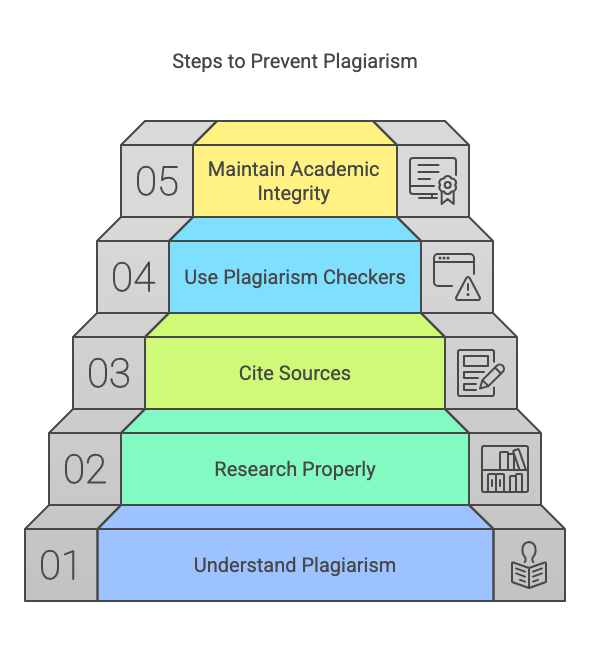Plagiarism and Academic Integrity: Best Practices for Ethical Research Writing
 Scribesquad
Scribesquad
Introduction
Academic integrity is the foundation supporting credible research alongside scholarly work activities. Plagiarism, whether intentional or accidental, undermines the trust and authenticity of research. The combination of easy and challenging conditions brought about by the rise of online resources creates a complex scenario where originality in writing becomes more straightforward and difficult to maintain.
This article examines academic integrity principles, the effects of plagiarism, and proven methods to conduct ethical research writing.
What is Plagiarism?
Plagiarism is using someone else’s work, ideas, or words without proper acknowledgment. It can take many forms, including:
Direct Copying: Replicating text verbatim without quotation marks or citations.
Paraphrasing Without Credit: Rewriting someone else’s ideas without attribution.
Self-Plagiarism: Reusing your own previously published work without disclosure.
Improper Citation: Failing to cite sources correctly or omitting citations altogether.
Plagiarism is not just an ethical issue; it can lead to severe consequences, including academic penalties, loss of credibility, and legal repercussions.
The Importance of Academic Integrity
Academic integrity ensures that research is conducted and communicated honestly and transparently. It fosters a culture of trust, respect, and fairness in the educational community. Here’s why it matters:
Credibility: Original work enhances the credibility of the researcher and their findings.
Trust: Readers trust research that is appropriately cited and free from plagiarism.
Innovation: By building on existing knowledge, ethical research encourages new ideas and advancements.
Reputation: Maintaining academic integrity protects the reputation of individuals and institutions.
Best Practices for Ethical Research Writing
To avoid plagiarism and uphold academic integrity, follow these best practices:
1. Understand Citation Styles
Different disciplines use specific citation styles, such as APA, MLA, Chicago, or Harvard. Familiarize yourself with the required style and use it consistently throughout your work. Proper citation includes:
In-text citations for direct quotes and paraphrased content.
A complete reference list or bibliography at the end of the document.
2. Use Plagiarism Detection Tools
Tools like Turnitin, Grammarly, and Copyscape can help identify unintentional plagiarism. Always run your work through these tools before submission to ensure originality.
3. Paraphrase Effectively
When paraphrasing, ensure you fully understand the original text and rewrite it in your own words. Always cite the source, even if the wording has changed.
4. Keep Track of Sources
Maintain a detailed record of all sources used during your research. This includes books, journal articles, websites, and even personal communications. Use reference management software like Zotero or EndNote to organize your citations.
5. Seek Permission for Reuse
If you reuse content from your previous work or someone else’s, seek permission and provide proper attribution. Transparency is key to avoiding self-plagiarism.
6. Educate Yourself
Stay informed about your institution’s policies on plagiarism and academic integrity. Attend workshops or seminars on ethical writing practices to enhance your skills.
7. Proofread and Edit
Carefully proofread your work to ensure that all sources are correctly cited and that your writing is original. Editing helps eliminate accidental plagiarism and improves the overall quality of your research.
Consequences of Plagiarism
Plagiarism can have serious repercussions, including:
Academic Penalties: Failing grades, suspension, or expulsion from academic programs.
Professional Repercussions: Damage to your reputation and career prospects.
Legal Consequences: Lawsuits or fines for copyright infringement.
Loss of Trust: Erosion of trust among peers, mentors, and the academic community.
How to Foster a Culture of Academic Integrity
Promoting academic integrity requires collective effort. Here’s how institutions and individuals can contribute:
Institutions:
Provide clear guidelines on plagiarism and ethical writing.
Offer training programs and resources for students and researchers.
Use plagiarism detection software to monitor submissions.
Individuals:
Commit to producing original work and giving credit where it’s due.
Encourage peers to uphold ethical standards.
Report instances of academic dishonesty when encountered.
Final Thoughts: Upholding Ethical Standards in Research
Academic integrity operates beyond rules as a dedication to the honest transmission of knowledge and proper recognition of intellectual work. By adhering to best ethical practices in research writing, academics help create a culture based on trust and innovation that benefits the entire academic community. Research credibility depends on maintaining original work and proper reference to sources while writing.
Subscribe to my newsletter
Read articles from Scribesquad directly inside your inbox. Subscribe to the newsletter, and don't miss out.
Written by

Scribesquad
Scribesquad
Writing is a lifestyle. I am about everything research and technology